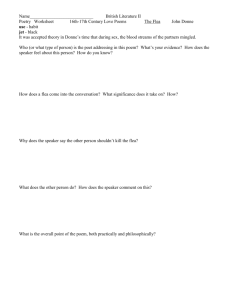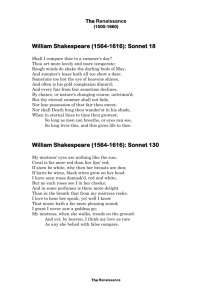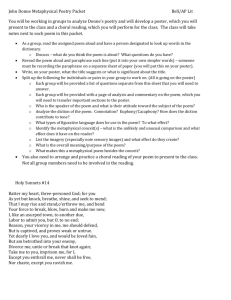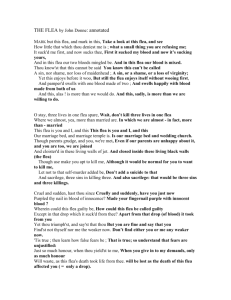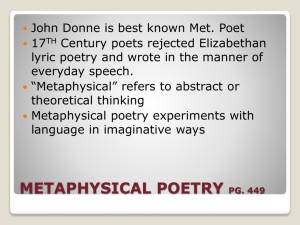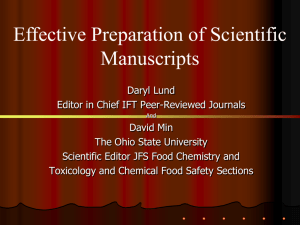Alexander Pope: Solitude: An Ode
advertisement
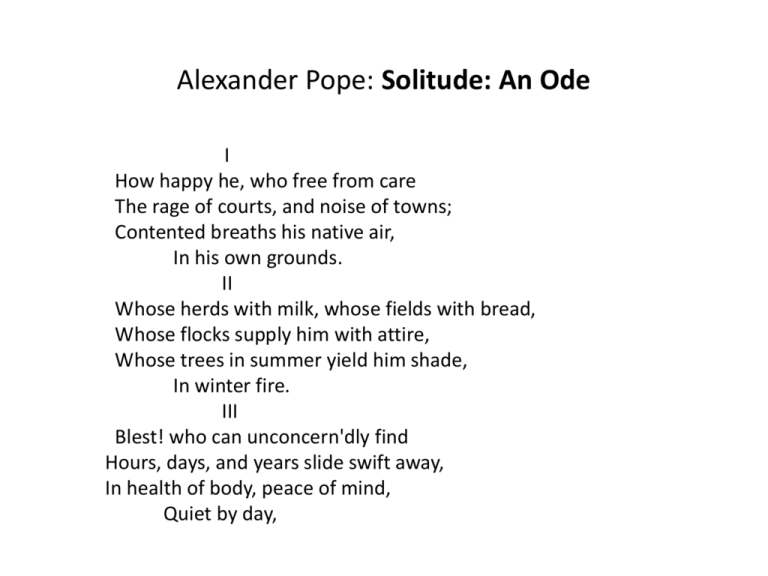
Alexander Pope: Solitude: An Ode
I
How happy he, who free from care
The rage of courts, and noise of towns;
Contented breaths his native air,
In his own grounds.
II
Whose herds with milk, whose fields with bread,
Whose flocks supply him with attire,
Whose trees in summer yield him shade,
In winter fire.
III
Blest! who can unconcern'dly find
Hours, days, and years slide swift away,
In health of body, peace of mind,
Quiet by day,
Alexander Pope: Solitude: An Ode
IV
Sound sleep by night; study and ease
Together mix'd; sweet recreation,
And innocence, which most does please,
With meditation.
V
Thus let me live, unheard, unknown;
Thus unlamented let me dye;
Steal from the world, and not a stone
Tell where I lye.
MEANINGS
Free from care: doesn’t have responsibility
Rage of courts: angry feelings in court
Contented: satisfied
Herds: group of animals (in the poem cows)
Flocks: group of animals (sheep)
Attire: dress
Blest: blessed
unconcern'dly: without care
MEANINGS
Slide: move
Sound: quiet
Ease: comfort
Unlamented: without grief
Dye: die
Steal from the world: leave the world
Lye: lie
Form
This poem is written in the form of an ode.
Rhyme scheme: abab cdcd efef ghgh ijij
There are five stanzas in every stanza there are
four lines.
The total number of lines in the poem is 20.
Themes
Happiness
Loneliness
Elements of Happiness According to Pope
1.
2.
3.
4.
5.
6.
7.
8.
No responsibility.
No noise or problems.
Satisfaction with life in one’s own land.
Self- sufficient.
Health of body & peace of mind.
Quiet sleep at night.
Study & comfort.
Recreation, Innocence & Meditation.
Life in the countryside
The poem calls for a life in the countryside away
from the noisy life of big cities.
John Dryden: Happy the Man
Happy the man, and happy he alone,
He who can call today his own:
He who, secure within, can say,
Tomorrow do thy worst, for I have lived today.
Be fair or foul or rain or shine
The joys I have possessed, in spite of fate, are mine.
Not Heaven itself upon the past has power,
But what has been, has been, and I have had my hour.
Meanings
Secure within: having inner peace
Fair: beautiful
Foul: bad
Rain or shine: be rainy or shiny
Themes
Happiness
Carpe Diem
Form
This is a short poem written in the form of
rhyming couplets
Aa bb cc dd
Elements of Happiness According to Dryden
•
•
•
•
•
In possession of the moment.
Inner peace.
No worries about the future.
No worries about the past.
Enjoying the pleasures of the moment.
The Concept of Happiness Between Pope and Dryden
Pope
1.
2.
3.
4.
5.
6.
7.
8.
9.
No responsibility.
No noise or problems.
Satisfaction with life in one’s
own land.
Self- sufficient.
Health of body & peace of
mind.
Quiet sleep at night.
Study & comfort.
Recreation, Innocence &
Meditation.
Loneliness.
Dryden
1.
2.
3.
4.
5.
In possession of the moment.
Inner peace.
No worries about the future.
No worries about the past.
Enjoying the pleasures of the
moment.
William Blake: Chimney Sweeper (Songs of Experience)
A little black thing among the snow,
Crying "weep! 'weep!" in notes of woe!
“Where are thy father and mother? say?"
“They are both gone up to the church to pray.
Because I was happy upon the heath,
And smil'd among the winter's snow,
They clothed me in the clothes of death,
And taught me to sing the notes of woe.
And because I am happy and dance and sing,
They think they have done me no injury,
And are gone to praise God and his Priest and King,
Who make up a heaven of our misery."
Meanings
Woe: sadness
Heath: an area of land that is not farmed, where grass and other
small plants grow, but where there are few trees or bushes
Clothed: dressed
Form
This poem is a lyric.
Rhyme scheme: aabb cdcd efef
Themes
Experience
Exploitation of Children
Image of the Child in the Poem
Not orphan (parents alive)
Experienced
Exploited
Aware of exploitation
Realistic
Intelligent
Sad
Critical
Techniques
Metaphor
A little black thing (exploited child)
Contrast
Blackness of The exploited child X Whiteness of snow
Comparison Between the Images of the Child in the Poems
Innocence
Orphan (Motherless)
Innocent
Exploited
Unaware of exploitation
Dreamy
Naive
Happy
Uncritical
Experience
Parents Alive
Experienced
Exploited
Aware of Exploitation
Realistic
Intelligent
Sad
Critical
John Donne: Death Be Not Proud (1618)
Death be not proud, though some have called thee
Mighty and dreadful, for, thou art not so,
For, those, whom thou think'st, thou dost overthrow,
Die not, poor death, nor yet canst thou kill me.
From rest and sleep, which but thy pictures be,
Much pleasure, then from thee, much more must flow,
And soonest our best men with thee doe go,
Rest of their bones, and souls delivery.
Thou art slave to Fate, Chance, kings, and desperate men,
And dost with poison, war, and sickness dwell,
And poppy, or charms can make us sleep as well,
And better then thy stroke; why swell'st thou then;
One short sleep past, we wake eternally,
And death shall be no more, death, thou shalt die.
Summary
• The voice of the poem is a hero, belittling Death and bringing hope and
peace to the readers. He unmasks Death and shows that Death's pride is
ill-founded; based on empty accomplishments. The voice is assertive,
facing Death staunchly. Immediately, the convention of personification is
used. Death obtains the human vice of pride. Death is shown to be a fool.
Vocabulary
Thee: you
Mighty: powerful
Dreadful: fearful
Thou art: you are
Overthrow: destroy
Dwell: live
Poppy: drug
Charm: spell
Eternally: forever
Themes
Death
Faith
Form
• By form this poem is a sonnet (a lyric poem of 14 lines; the first 8 lines are
called the octave and the last 6 lines are called the sestet).
• It is one of many sonnets that are part of a collection called The Holy
Sonnets. This collection is comprised of nineteen sonnets with themes
that pertain to Christian philosophy.
• The rhyme scheme for this poem is “abbaabbacddcee”.
Techniques
• Apostrophe: “Death be not proud…”
• Personification: Death
• Paradox (a statement or situation containing apparently contradictory or
incompatible elements but upon close inspection might be true). The
poem ends with the paradox: “death, thou shalt die”
Donne’s the Flea: Analysis
Form
THE FLEA is a love poem in rhyming couplets
AABBCCDDD
(there is one triplet at the end of the stanza)
The Flea: Setting
Literally, the poem is set anywhere you might find fleas, which in 17th-century
England included...everywhere.
1.
Imaginatively, the poem begins by zooming in on the woman's smooth,
pale arm.
2.
Next we actually go inside the flea, where a marriage is consecrated
with the mingling of two bloods.
3.
Then the poem moves outside the flea. The woman's hand comes down
– smack – on the bloodsucking flea, coloring one of her nails "purple"
with its blood and hers. The speaker looks aghast, as if the world has
just ended, but he gets over it a moment later.
Themes
Seduction
Physical Love
Symbols
The Flea: marriage bed, marriage temple, union
between man and woman
Blood: life & the soul.
Techniques
• Apostrophe (address to an imaginary or absent person):
Line 1: “Mark but this flea, and mark”
• Personification: Line 8: “And pamper’d swells with one blood made
of
two”. The flea is seen like a pampered person, gorging on a feast of blood.
• Metaphor: “O stay, three lives in one flea spare,” (blood is equated with
life)
• Metaphysical Conceit: the flea, marriage bed, marriage temple,
microcosm of love and life.
John Donne: The Flea
Donne: Biography
•Born in Bread Street in 1572 to a prosperous Roman Catholic family.
•1593 his brother, Henry died of a fever in prison after arrested for giving
sanctuary to a proscribed catholic priest. Donne began to have doubts in his
faith.
•1601 secretly married Lady Egerton’s niece, seventeen-year-old Anne
More, daughter of Sir George More.
•1611 Donne was invited and joined Sir Robert Drury to the continental trip. It
was then Donne composed several of his most prominent poems. “A
Valediction: Forbidden Mourning”.
•1617 Donne’s wife died. Within 16 years, she gave him 12 children.
•1631 Donne died of serious illness.
Donne’s Style
Donne’s work was famous for the themes of his faith in God and
women. Though not writing with conventional glamorous style of
verse, Donne successfully and beautifully connect the time and
space in his poems with extraordinary images. Donne’s usage of
diction and language in composing his work is considered
revolutionary of his time. His style is regarded as “metaphysical” in
the modern study of poem.
The Flea (1633)
Mark but this flea, and mark in this,
How little that which thou deny'st me is;
Me it sucked first, and now sucks thee,
And in this flea, our two bloods mingled be;
Confess it, this cannot be said
A sin, or shame, or loss of maidenhead,
Yet this enjoys before it woo,
And pampered swells with one blood made of two,
And this, alas is more than we would do.
The Flea (1633)
Oh stay, three lives in one flea spare,
Where we almost, nay more than married are.
This flea is you and I, and this
Our marriage bed, and marriage temple is;
Though parents grudge, and you, we're met,
And cloistered in these living walls of jet.
Though use make you apt to kill me,
Let not to this, self murder added be,
And sacrilege, three sins in killing three.
The Flea (1633)
Cruel and sudden, hast thou since
Purpled thy nail, in blood of innocence?
In what could this flea guilty be,
Except in that drop which it sucked from thee?
Yet thou triumph'st, and say'st that thou
Find'st not thyself, nor me the weaker now;
'Tis true, then learn how false, fears be;
Just so much honour, when thou yield'st to me,
Will waste, as this flea's death took life from thee
The Flea: Lines Modernized
Mark but this flea, and mark in this,
See this flea and see this:
How little that which thou deny'st me is;
How little the thing that you denied me is
Me it sucked first, and now sucks thee,
The flea sucked me first and now sucks you
And in this flea, our two bloods mingled be;
And in this flea our two bloods are mingled
Confess it, this cannot be said
Admit it that this cannot be called
A sin, or shame, or loss of maidenhead,
A sin or shame or loss of virginity
Yet this enjoys before it woo,
Yet this flea enjoys before it courts
And pampered swells with one blood made of two,
And having thus indulged itself
And this, alas is more than we would do.
And this after all is more than we would do.
The Flea: Lines Modernized
Oh stay, three lives in one flea spare,
Oh stop, spare three lives in one flea
Where we almost, nay more than married are.
Where we are almost, no, more, than married.
This flea is you and I, and this
This flea is you and I and also
Our marriage bed, and marriage temple is;
Our marriage bed and marriage temple;
Though parents grudge, and you, we're met,
Despite (your? our?) parents' and your disapproval
And cloistered in these living walls of jet.
And sheltered in the living body of this flea.
Though use make you apt to kill me,
Though habit makes you want to kill me
Let not to this, self murder added be,
Don't add self murder to this
And sacrilege, three sins in killing three.
And sacrilege as well in killing three beings.
The Flea: Lines Modernized
Cruel and sudden, hast thou since
Cruel and sudden, have you since
Purpled thy nail, in blood of innocence?
Purpled your nail, in innocent blood?
In what could this flea guilty be,
What is this flea guilty of
Except in that drop which it sucked from thee?
Except in having sucked that drop of blood from you?
Yet thou triumph'st, and say'st that thou
Yet you won and said that you
Find'st not thyself, nor me the weaker now;
Did not find neither yourself nor me any weaker
'Tis true, then learn how false, fears be;
Just so much honour, when thou yield'st to me,
Such a little honor, when you surrender to me,
Will waste, as this flea's death took life from thee.
Will be lost, the same way that none of your life is lost when the flea dies.
Vocabulary
•
•
•
•
Mark: observe, notice.
thou: you
deny'st: deny
our two bloods mingled be: coition was commonly assumed to entail a
mingling of bloods.
• loss of maidenhead: loss of virginity.
• Yet this enjoys before it woo: the flea enjoys this liberty without the effort
of wooing the lady.
• And pampered swells with one blood made of two: Renaissance medical
theory held that blood was mingled during sexual intercourse, leading to
conception; thus the image of swelling suggests pregnancy.
• stay: stop; don't kill the flea.
Vocabulary
• jet: black marble; the "living walls of jet" here refer to the body of the flea.
• use: custom.
• sacrilege: since the flea is a "marriage temple," killing it would be
sacrilege.
• Hast: Have.
• triumph'st: triumph.
• say'st: say.
• find'st: find.
• Thyself: yourself.
• now: now that she has killed the flea.
• yield'st: yield.
Paraphrase
Stanza I: Look at this flea and look at how little the thing that you denied me
is. It sucked me first and now sucks you and in this flea our two bloods are
mingled. Admit it that this cannot be called a sin, a shame, or loss of
virginity. Yet the flea enjoys before it courts and having been indulged,
swells with one blood made of two, and this, sadly, is more than we would
do.
Stanza II: Oh, stop, spare three lives in one flea where we are almost, nay
more than married.
Stanza III: Cruel and sudden, you have purpled your nail in innocent
blood. What is this flea guilty of, except in that drop (of blood) that it
sucked from you?
Metaphysical Poetry
The term "metaphysical poetry" is used to designate the work of 17th-century
poets who were part of a school of poets using similar methods and who revolted
against the romantic conventionalism of Elizabethan love poetry, in particular the
Petrarchan conceit.
John Donne was the acknowledged leader of these poets.
John Donne, George Herbert, Andrew Marvel, Henry Vaughn
The Tribe of Donne
Poets
Metaphysical Conceit
A "metaphysical conceit" is a far-fetched and ingenious extended comparison
(or "conceit") used by metaphysical poets to explore all areas of
knowledge. It finds telling and unusual analogies for the poet's ideas in the
startlingly esoteric or the shockingly commonplace -- not the usual stuff of
poetic metaphor.
Examples:
• Crashaw's comparison of Mary Magdalene's tear-filled eyes as "Two walking baths;
two weeping motions / Portable and compendious oceans."
• Donne's comparison of his union with his lover to the draftsman's compass in "A
Valediction: Forbidding Mourning."
Metaphysical Conceit
Typical metaphysical conceits come from a wide variety of areas of
knowledge:
•
•
•
•
Coins (mintage).
Alchemy; medieval philosophy and angelology.
Meteorology (sighs are blasts, tears are floods).
Mythology (the Phoenix's riddle, the river Styx).
• Government ("she is the state, he is the Prince" from Donne's "The Sun
Rising").
• Travelling (Donne's "Go and Catch a Falling Star").
• Astronomy& metallurgy ("gold to airy thinness beat").
• Geometry (the twin compasses).
• Law & geography.
Characteristics of Metaphysical Poetry
• a tendency to psychological analysis of the emotion of love and
religion.
• a penchant for imagery that is novel, "unpoetical" and sometimes
shocking, drawn from the commonplace (actual life) or the remote
(erudite sources), including the extended metaphor of the
metaphysical conceit.
• simple diction (compared to Elizabethan poetry) which echoes the
cadences of everyday speech.
• form: frequently an argument (with the poet's lover; with God; with
oneself).
Characteristics of Metaphysical Poetry
meter: often rugged, not "sweet" or smooth like Elizabethan verse.
This ruggedness goes naturally with the Metaphysical poets' attitude
and purpose: a belief in the perplexity of life, a spirit of revolt, and
the putting of an argument in speech rather than song.
The best metaphysical poetry is honest, unconventional, and reveals
the poet's sense of the complexities and contradictions of life. It is
intellectual, analytical, psychological, and bold; frequently it
is absorbed in thoughts of death, physical love, and religious
devotion.
Robert Herrick: To the Virgins, to Make Much of Time
Gather ye rosebuds while ye may,
Old Time is still a-flying:
And this same flower that smiles today
Tomorrow will be dying.
The glorious lamp of heaven, the sun,
The higher he’s a-getting,
The sooner will his race be run,
And nearer he’s to setting.
Robert Herrick: To the Virgins, to Make Much of Time
That age is best which is the first,
When youth and blood are warmer;
But being spent, the worst, and worst
Time still succeed the former.
Then be not coy, but use your time,
And while ye may, go marry:
For having lost but once your prime,
You may for ever tarry.
Meanings
Rosebud: the beginning stage of a rose flower
Ye: you
A-flying: passing quickly
The sooner will his race be run: shortly the sun’s journey will
finish
Setting: sunset
Prime: youth
Tarry: to stay somewhere for longer than expected
Form
Lyric poem
Rhyme scheme: abab cdcd efef ghgh
Theme
Carpe diem: Living life to the fullest
Techniques
Metaphor:
Rosebuds: opportunities specially opportunities to win
a husband.
Time: a flying creature
Flower: maiden
Sun: lamp
Techniques
Personification
Flower: (only humans can smile)
Sun: he & his
Techniques
Alliteration
And this same flower that smiles today
The higher he’s a-getting
Romantic Poetry
The Romantic Period 1800-1850
Some Definitions of Romanticism
1.
2.
3.
4.
“the addition of strangeness to beauty” (Pater)
“the renaissance of wonder” (Watts Dunton)
“the extraordinary development of imaginative sensibility” (Herford)
“an accentuated predominance of emotional life, provoked and directed by
the exercise of imaginative vision” ( Legious & Cazamian)
Major Poets
William Blake
William Wordsworth
S.T. Coleridge
P. B. Shelley
Lord Byron
John Keats
Chief Characteristics of Romantic Poetry
1.
2.
3.
4.
5.
6.
7.
Subjectivity.
Romantic poetry is spontaneous overflow of powerful passion.
Love of the Supernatural.
A romantic poet is a dissatisfied individual.
Love of nature.
Emphasis of the inherent dignity and nobility of man.
Simplicity in theme and treatment.
William Blake: The Chimney Sweeper (Songs of Innocence)
When my mother died I was very young,
And my father sold me while yet my tongue
Could scarcely cry " 'weep! 'weep! 'weep! 'weep!"
So your chimneys I sweep, and in soot I sleep.
There's little Tom Dacre, who cried when his head,
That curl'd like a lamb's back, was shav'd, so I said
"Hush, Tom! never mind it, for when your head's bare
You know that the soot cannot spoil your white hair."
And so he was quiet, and that very night
As Tom was a-sleeping, he had such a sight!
That thousands of sweepers, Dick, Joe, Ned, and Jack,
Were all of them lock'd up in coffins of black.
William Blake: The Chimney Sweeper (Songs of Innocence)
And by came an Angel who had a bright key,
And he open'd the coffins and set them all free;
Then down a green plain leaping, laughing, they run,
And wash in a river, and shine in the sun.
Then naked and white, all their bags left behind,
They rise upon clouds and sport in the wind;
And the Angel told Tom, if he'd be a good boy,
He'd have God for his father, and never want joy.
And so Tom awoke, and we rose in the dark,
And got with our bags and our brushes to work.
Though the morning was cold, Tom was happy and warm;
So if all do their duty they need not fear harm.
Meanings
Curl: to make something into the shape of a curl.
Hush: be silent.
Soot: a black powder made of carbon which is produced when
coal, wood, etc. is burnt.
Sight: dream.
Themes
Innocence
Exploitation of Children
Form
This poem is written in the form of a lyric.
It is made of six stanzas each stanza is made of
four lines.
Rhyme: aabb…
Image of the Child in the Poem
Orphan (motherless)
Innocent
Exploited
Unaware of exploitation
Dreamy
Naive
Happy
Uncritical
Technical Devices
Simile:
Head {That curl'd like a lamb's back}
Onomatopoeia:
" 'weep! 'weep! 'weep! 'weep!“
Andrew Marvell: To His Coy Mistress
Had we but world enough, and time,
This coyness, lady, were no crime.
We would sit down and think which way
To walk, and pass our long love's day;
Thou by the Indian Ganges' side
Shouldst rubies find; I by the tide
Of Humber would complain. I would
Love you ten years before the Flood;
And you should, if you please, refuse
Till the conversion of the Jews.
My vegetable love should grow
Vaster than empires, and more slow.
An hundred years should go to praise
Thine eyes, and on thy forehead gaze;
Two hundred to adore each breast,
But thirty thousand to the rest;
An age at least to every part,
And the last age should show your heart.
For, lady, you deserve this state,
Nor would I love at lower rate.
Andrew Marvell: To His Coy Mistress
But at my back I always hear
Time's winged chariot hurrying near;
And yonder all before us lie
Deserts of vast eternity.
Thy beauty shall no more be found,
Nor, in thy marble vault, shall sound
My echoing song; then worms shall try
That long preserv'd virginity,
And your quaint honour turn to dust,
And into ashes all my lust.
The grave's a fine and private place,
But none I think do there embrace.
Andrew Marvell: To His Coy Mistress
Now therefore, while the youthful hue
Sits on thy skin like morning dew,
And while thy willing soul transpires
At every pore with instant fires,
Now let us sport us while we may;
And now, like am'rous birds of prey,
Rather at once our time devour,
Than languish in his slow-chapp'd power.
Let us roll all our strength, and all
Our sweetness, up into one ball;
And tear our pleasures with rough strife
Thorough the iron gates of life.
Thus, though we cannot make our sun
Stand still, yet we will make him run.
Meanings
Mistress: lady, manager, caretaker, courtesan, sweetheart, lover.
coyness: reluctance; playing hard to get.
Ganges: River in Asia
rubies: Gems
Humber: River in northeastern England
vegetable love: love cultivated and nurtured like a vegetable so that it
flourishes prolifically
this state: This lofty position; this dignity.
Time's wingèd chariot: In Greek mythology, the sun was personified as the
god Apollo, who rode his golden chariot from east to west each day. Thus,
Marvell here associates the sun god with the passage of time.
marble vault: The young lady's tomb.
Meanings
quaint: Preserved carefully or skillfully.
dew: The 1681 manuscript of the poem uses glew (not dew), apparently as a
coined past tense for glow.
transpires: Erupts, breaks out, emits, gives off.
slow-chapt: Chewing or eating slowly.
Thorough: Through.
Summary
In response to a young man’s declarations of love for a
young lady, the lady is playfully hesitant. But dallying
will not do, he says, for youth passes swiftly. He and the
lady must take advantage of the moment, he says, and
“sport us while we may.” Oh, yes, if they had “world
enough, and time” they would spend their days in idle
pursuits, leisurely passing time while the young man
heaps praises on the young lady. But they do not have the
luxury of time, he says, for “time's wingéd chariot” is ever
racing along. Before they know it, their youth will be
gone; there will be only the grave. And so, the poet
pleads his case: Seize the day.
Theme
Carpe diem (meaning seize the day)
Characters
• Young Man: He pleads with a young lady to stop playing hard
to get and accept his love.
• Young Lady: A coquettish woman.
Setting
Probably someplace in England (the native land
of the author), perhaps in northeastern
England near the River Humber.
Form
This poem is written in the form of dramatic
monologue in rhyming couplets.
Techniques
Hyperbole
1.
I would/Love you ten years before the Flood.
2.
And you should, if you please, refuse
Till the conversion of the Jews.
3.
An hundred years should go to praise
Thine eyes, and on thy forehead gaze;
4.
Two hundred to adore each breast,
5.
thirty thousand to the rest;
6.
An age at least to every part,
And the last age should show your heart.
7.
And yonder all before us lie
Deserts of vast eternity.
Techniques
Simile
1.
while the youthful hue
Sits on thy skin like morning dew.
2.
Now let us sport us while we may;
And now, like am'rous birds of prey.
Conceit
Vegetable love
Richard Lovelace: To Lucasta, Going to the Wars
Tell me not, sweet, I am unkind,
That from the nunnery
Of thy chaste breast and quiet mind,
To war and arms fly.
True, a new mistress now I chase.
The first foe in the field;
And with a stronger faith embrace
A sword, a horse, a shield.
Yet this inconstancy is such
As you too shall adore;
I could not love thee, dear, so much,
Loved I not honour more.
Richard Lovelace: To Lucasta, Going to the Wars
Nunnery: convent
Chaste: pure, celibate
Foe: enemy
Embrace: accept, believe in
Inconstancy: infidelity, betrayal
Form
This poem is called a song. It is lyrical in nature.
It is made of three stanzas. It is very much like
a letter in which the poet tells his mistress,
Lucasta, that he is leaving her to follow a new
mistress, the war.
Rhyme: ABAB CDCD EFEF
Themes
Love
Duty
Honour
Techniques
Metaphor
foe in the field: mistress
